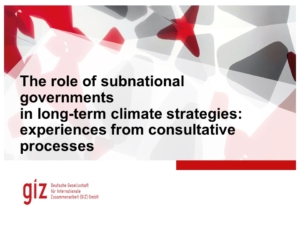The role of subnational governments in long-term climate strategies
Event Summary
The Climate Policy Meets Urban Development (CPMUD) Project together with the Low Emission Development Strategies Global Partnership (LEDS GP) hosted a joint event for GIZ staff with a background in climate governance and urban development. The meeting featured two speakers from Chile and Slovenia, who could report from their experiences with collaborative climate action in designing long-term strategies within their countries.
Jordan Harris, National Government and Climate Action Expert for COP25 at the Ministry of Environment in Chile, talked about the comprehensive climate governance architecture in Chile, that had just updated its NDC in April this year. In the document, Chile acknowledges “the importance of capacity building and the development of multi-level governance to strengthen resilience in communities and specific localities through the establishment of a multi-level governance system.” Apart from that, Chile is using its continued COP25 Presidency to shape COP26 in Glasgow into “The Multilevel Action COP”.
At the national level, Chile had started an “unprecedented participatory approach” when drafting their climate change law, with workshops in every region of Chile. A process, for which the “LEDS GP support had been instrumental”, as Harris said. Moreover, as part of the updated NDC, Chile initiated Regional Climate Change Committees, which are tasked to plan and implement climate change measures “in close collaboration with central government, municipalities, and other non-state and sub-national actors.”
Chile, with its highly centralized administrative structure and – until recently – rather little stakeholder involvement in national climate change decision-making processes, is also piloting Regional Climate Change Action Plans in four regions.
Slovenia, where 2 million citizens divide into 212 municipalities – without a regional governance level in between – has also started a long-term consultative processes on the local level, called Life Climate Path 2050. Katarina Trstenjak, who is a policy expert at the Jožef Stefan Institute, shared her experiences from implementing the project that aims to enhance the use of quantitative analyses among decision-makers and stakeholders.
One outstanding part of it are local scoreboards, which municipalities are using to visualise progress in emissions reductions. Alongside the 27 workshops and involvement of hundreds of experts from different levels and sectors, these scoreboards have proven to be “a good feature” in the collaborative processes.
Katarina Trstenjak concluded this event by restating the vision of every collaborative climate action effort: “Going to net zero requires everybody to be on board, it needs engagement of all layers and sectors.”


